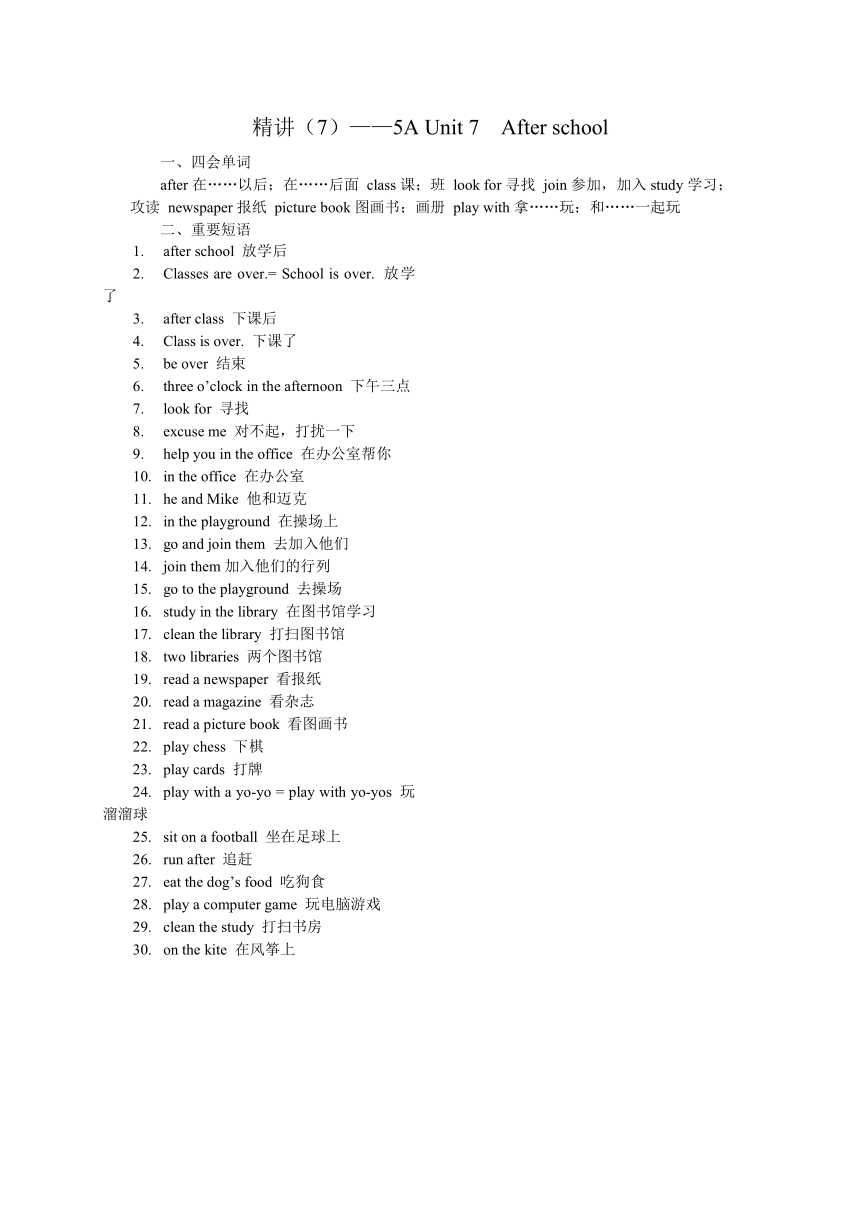小学英语牛津译林苏教版 五年级上册Unit 7 After school精讲
文档属性
| 名称 | 小学英语牛津译林苏教版 五年级上册Unit 7 After school精讲 |  | |
| 格式 | zip | ||
| 文件大小 | 13.4KB | ||
| 资源类型 | 教案 | ||
| 版本资源 | 牛津苏教版 | ||
| 科目 | 英语 | ||
| 更新时间 | 2014-01-06 21:59:03 | ||
图片预览

文档简介
精讲(7)——5A Unit 7 After school
一、四会单词
after在……以后;在……后面 class课;班 look for寻找 join参加,加入study学习;攻读 newspaper报纸 picture book图画书;画册 play with拿……玩;和……一起玩
二、重要短语
1.
2. after school 放学后
3. Classes are over.= School is over. 放学了
4. after class 下课后
5. Class is over. 下课了
6. be over 结束
7. three o’clock in the afternoon 下午三点
8. look for 寻找
9. excuse me 对不起,打扰一下
10. help you in the office 在办公室帮你
11. in the office 在办公室
12. he and Mike 他和迈克
13. in the playground 在操场上
14. go and join them 去加入他们
15. join them加入他们的行列
16. go to the playground 去操场
17. study in the library 在图书馆学习
18. clean the library 打扫图书馆
19. two libraries 两个图书馆
20. read a newspaper 看报纸
21. read a magazine 看杂志
22. read a picture book 看图画书
23. play chess 下棋
24. play cards 打牌
25. play with a yo-yo = play with yo-yos 玩溜溜球
26. sit on a football 坐在足球上
27. run after 追赶
28. eat the dog’s food 吃狗食
29. play a computer game 玩电脑游戏
30. clean the study 打扫书房
31. on the kite 在风筝上
三、重要句型
1.It is three o’clock in the afternoon. 现在是下午三点。
只有表示整点的时间后面才可以加上o’clock, 表示具体的几点钟时在前面加上at. 如:What time do you go home I go home at four fifteen.
2.Classes are over. 放学了。
be over 表示“结束”的意思,课都结束了,也就相当于放学了的意思。所以Classes are over.= School is over.
3. Gao Shan is looking for Wang Bing. 高山正在寻找王兵。
look for与find意义相近,但二者的侧重点不同。如:I’m looking for my watch, but I can’t find it. 我在寻找(动作的过程)我的手表,但我没找到(动作的结果)。读一读下面这个句子,你能发现什么?Look at the picture. What can you see
4.⑴Is Wang Bing helping you in the office 王兵在办公室里帮助你吗?
⑵Are they playing basketball 他们在打篮球吗?
这两个句子都是现在进行时的一般疑问句。你发现什么没有?对了,把be动词提到前面就行了。怎么回答呢?很简单。分别是:
⑴Yes, he is(此处不可缩写)./No, he isn’t.=No, he’s not.
⑵Yes, they are(此处不可缩写)./No, they aren’t.=No, they’re not. 明白了吧!
5.I’ll go and join them. 我将要去加入他们。
I’ll是I will的缩写形式,表示“我将要”的意思,带有一定的意愿色彩。如:I’ll go to Beijing next year. 明年我要去北京。
6.My sister is doing some cleaning. 我妹妹在打扫。
do some cleaning 打扫,做清洁工作,do some washing 洗东西,洗衣服 do some reading 读书,阅读,do some shopping 买东西,这些短语的结构可以归纳为do + some/the + v-ing, 很有用的,记住了!
四、语法要点
这一单元的语法项目是学习“现在进行时”的一般疑问句和特殊疑问句。看这样一组句子:
肯定句:They are cleaning the library.
一般疑问句:Are they cleaning the library
肯定回答:Yes, they are. 否定回答:No, they aren’t./No, they’re not.
特殊疑问句:What are they doing?
由此,我们可以看出:现在进行时的一般疑问句就是把动词be提到句子开头,其它的单词按顺序书写。而特殊疑问句是先找到特殊疑问词,再加上一般疑问句即可。
试着将下面句子变成一般疑问句及特殊疑问句:
⑴She is reading a magazine. →
⑵They are playing cards. →
⑶The dog is running after the mouse. →
PAGE
一、四会单词
after在……以后;在……后面 class课;班 look for寻找 join参加,加入study学习;攻读 newspaper报纸 picture book图画书;画册 play with拿……玩;和……一起玩
二、重要短语
1.
2. after school 放学后
3. Classes are over.= School is over. 放学了
4. after class 下课后
5. Class is over. 下课了
6. be over 结束
7. three o’clock in the afternoon 下午三点
8. look for 寻找
9. excuse me 对不起,打扰一下
10. help you in the office 在办公室帮你
11. in the office 在办公室
12. he and Mike 他和迈克
13. in the playground 在操场上
14. go and join them 去加入他们
15. join them加入他们的行列
16. go to the playground 去操场
17. study in the library 在图书馆学习
18. clean the library 打扫图书馆
19. two libraries 两个图书馆
20. read a newspaper 看报纸
21. read a magazine 看杂志
22. read a picture book 看图画书
23. play chess 下棋
24. play cards 打牌
25. play with a yo-yo = play with yo-yos 玩溜溜球
26. sit on a football 坐在足球上
27. run after 追赶
28. eat the dog’s food 吃狗食
29. play a computer game 玩电脑游戏
30. clean the study 打扫书房
31. on the kite 在风筝上
三、重要句型
1.It is three o’clock in the afternoon. 现在是下午三点。
只有表示整点的时间后面才可以加上o’clock, 表示具体的几点钟时在前面加上at. 如:What time do you go home I go home at four fifteen.
2.Classes are over. 放学了。
be over 表示“结束”的意思,课都结束了,也就相当于放学了的意思。所以Classes are over.= School is over.
3. Gao Shan is looking for Wang Bing. 高山正在寻找王兵。
look for与find意义相近,但二者的侧重点不同。如:I’m looking for my watch, but I can’t find it. 我在寻找(动作的过程)我的手表,但我没找到(动作的结果)。读一读下面这个句子,你能发现什么?Look at the picture. What can you see
4.⑴Is Wang Bing helping you in the office 王兵在办公室里帮助你吗?
⑵Are they playing basketball 他们在打篮球吗?
这两个句子都是现在进行时的一般疑问句。你发现什么没有?对了,把be动词提到前面就行了。怎么回答呢?很简单。分别是:
⑴Yes, he is(此处不可缩写)./No, he isn’t.=No, he’s not.
⑵Yes, they are(此处不可缩写)./No, they aren’t.=No, they’re not. 明白了吧!
5.I’ll go and join them. 我将要去加入他们。
I’ll是I will的缩写形式,表示“我将要”的意思,带有一定的意愿色彩。如:I’ll go to Beijing next year. 明年我要去北京。
6.My sister is doing some cleaning. 我妹妹在打扫。
do some cleaning 打扫,做清洁工作,do some washing 洗东西,洗衣服 do some reading 读书,阅读,do some shopping 买东西,这些短语的结构可以归纳为do + some/the + v-ing, 很有用的,记住了!
四、语法要点
这一单元的语法项目是学习“现在进行时”的一般疑问句和特殊疑问句。看这样一组句子:
肯定句:They are cleaning the library.
一般疑问句:Are they cleaning the library
肯定回答:Yes, they are. 否定回答:No, they aren’t./No, they’re not.
特殊疑问句:What are they doing?
由此,我们可以看出:现在进行时的一般疑问句就是把动词be提到句子开头,其它的单词按顺序书写。而特殊疑问句是先找到特殊疑问词,再加上一般疑问句即可。
试着将下面句子变成一般疑问句及特殊疑问句:
⑴She is reading a magazine. →
⑵They are playing cards. →
⑶The dog is running after the mouse. →
PAGE
